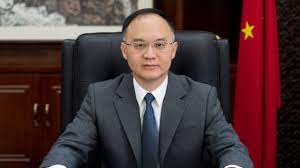China, Pakistan to jointly advance CPEC with greater efficiency; Chinese DHM

Gwadar Pro
Islamabad: Deputy Head of Mission, Chinese Embassy Pang Chunxue has said that China and Pakistan will jointly advance China-Pakistan Economic Corridor (CPEC) with greater efficiency making it an exemplar of high-quality Belt and Road cooperation.
Speaking as chief guest at an event titled “CPEC’s Defining Moment: Prospect and Challenges” organized by the Islamabad Institute of Conflict Resolution (IICR), Pang Chunxue highlighted the benefits of CPEC, saying that the landmark project of the BRI-CPEC has achieved fruitful results, bringing in 25.4 billion USD in investment, helping to add 6040 MW of electricity, 886 km of core national transmission network and 510 km of highways.
She said the two sides would make full use of the Joint Cooperation Committee (JCC) of the CPEC to ensure the speedy completion of projects under the corridor.

Under the promotion of CPEC, she mentioned that Pakistan’s energy shortage had been greatly addressed, transport infrastructure has been improved, and local people have gained a large number of employment opportunities.
She stressed that China would always put Pakistan as its priority for cooperation and work in joint hands to address various risks and challenges at the regional and international levels, deepen the China-Pakistan all-weather strategic cooperative partnership, and build a closer China-Pakistan community with a shared future in the new era.
In his opening remarks Moderator of the session, Professor Dr. Azhar Mahmood, said that CPEC is an opportunity that was harnessed as a result of Pakistan’s geo-strategic location.
Due to the same reason, it has vital importance in China’s One Belt One Road Initiative because it is the enriched and shortest route of east west connectivity providing connectivity to not only region but civilization.
Professor Dr Tahir Awan focused political aspects of CPEC saying that there are challenges and we must deal with them. He said Pakistan needs to take some ideas from its Chinese friends and that is what CPC is focused on “Modernization”. Pakistan can also use and implement the idea in its own requirement, Pakistan needs modernization in order to carry on with the emerging world or else be obsolete.
Adding further he said that there is a need to link industry and institute in order to solve the challenges, Pakistan needs to institutionalize the challenges to CPEC.
Joining from Sri Lanka, Dr George highlighted that every country is unique in its outlook and none should be looked at as a replication of the other rather unique relationship it has with the international community.
Dawood Butt said that the emerging world is talking about more politics than trade and in these times Pakistan should feel proud of CEPC rather being skeptical about it, we should introspect but not be skeptic about its productivity and benefit for Pakistan because China is leading in GDP and Pakistan is no 1 recipient of China Foreign Direct Investment.
“We need to remove bottlenecks for seamless functioning of CPEC. There is institutional consensus that CPEC is necessary to Pakistan. geography is important but history is equally important and Pakistan need to learn from Chinese history which is full of resilience,” he added.
Professor Shahid Raza said CPEC will happen amid all the challenges it faces, it may take slightly longer but it will be accomplished.
Javed Iqbal highlighted the technological aspects of CPEC saying that the foremost need of modern world is nowhere to be seen in CPEC project.





